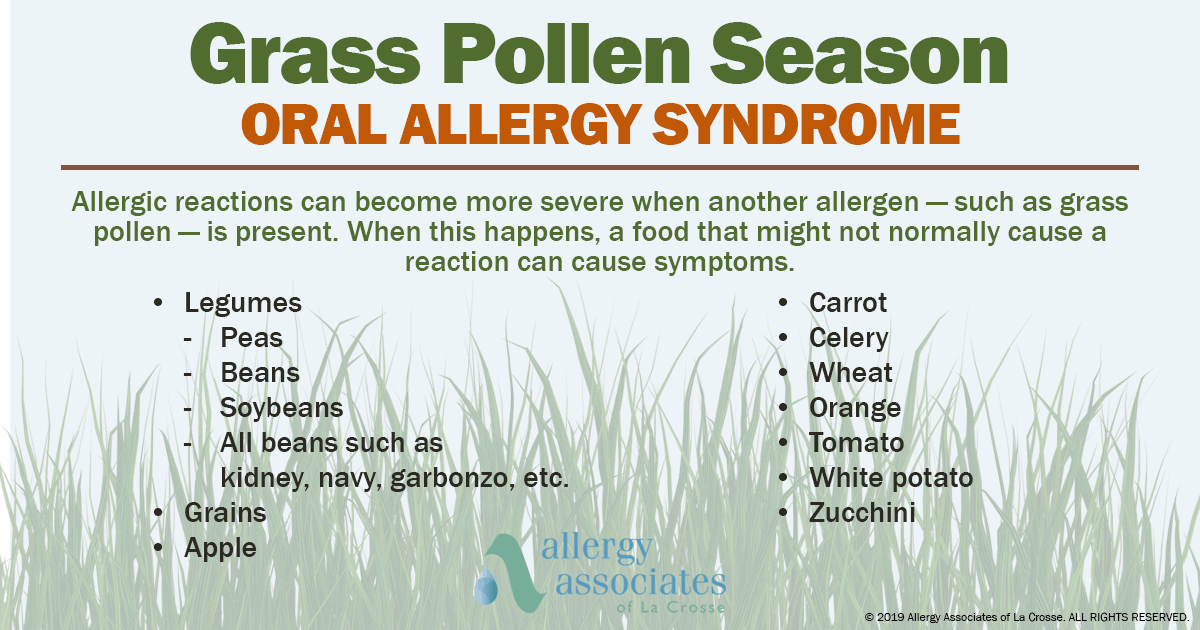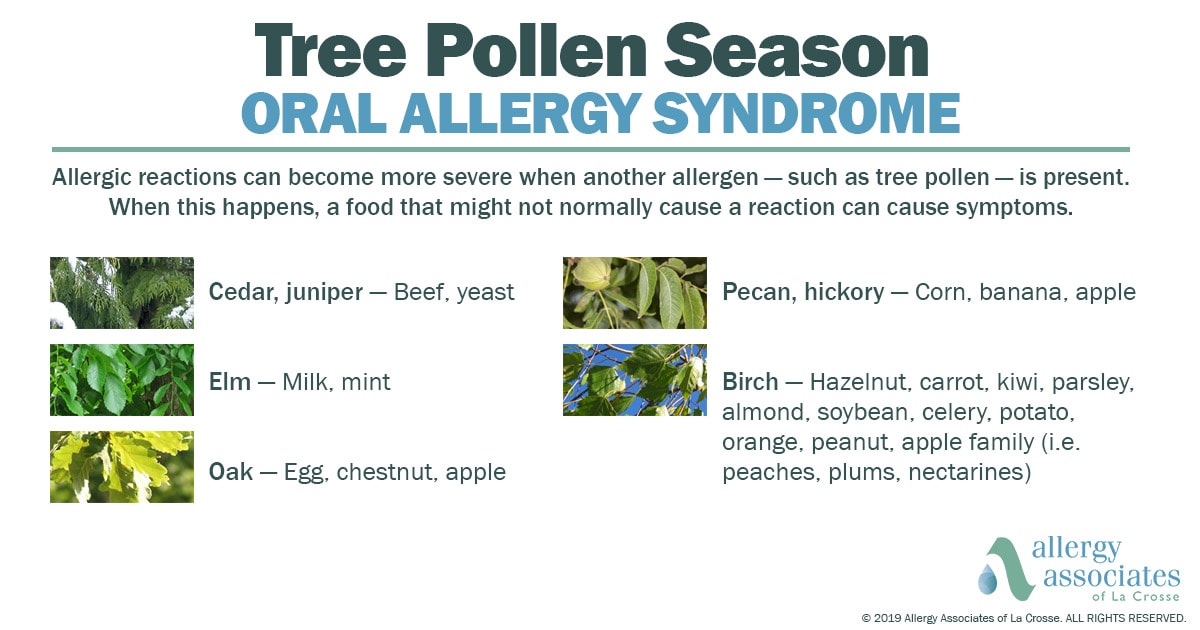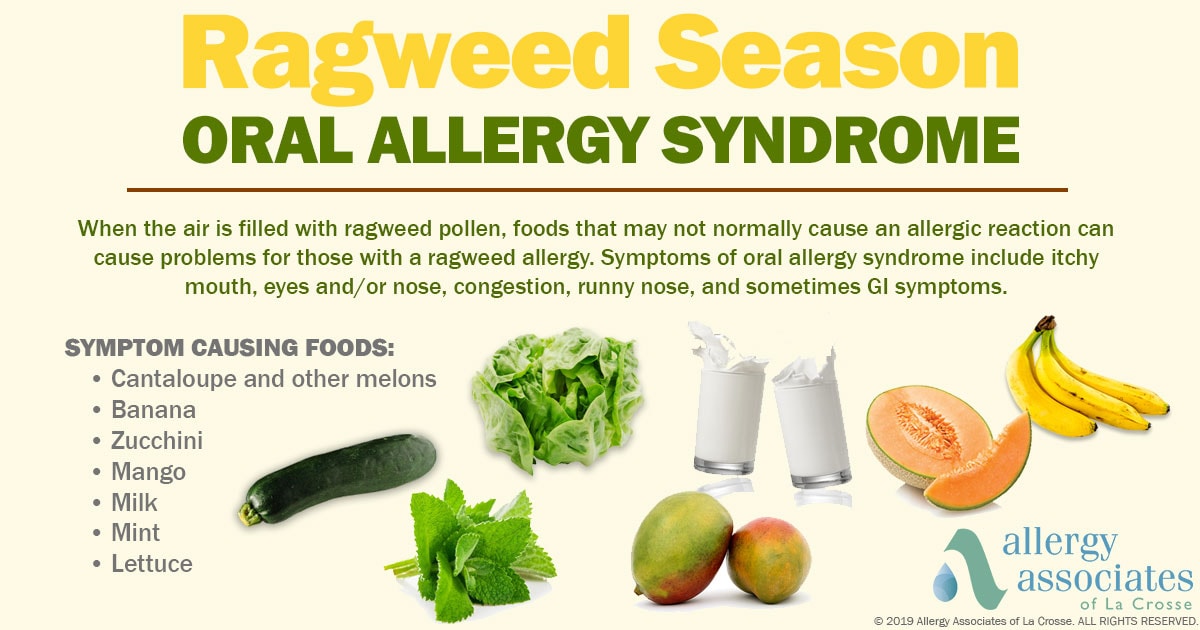Oral allergy syndrome (also known as Pollen Food Allergy Syndrome) is common for pollen-allergic people. Symptoms include mouth and throat itching, typically when eating fresh fruit and vegetables such as apples, melons, celery and carrots, but also with peanuts and tree nuts such as hazelnut.
Oral allergy syndrome symptoms
- Mouth itching is most common
- Gastrointestinal symptoms
- Nausea
- Vomiting
- Diarrhea
- Abdominal pain
- Symptoms like pollen exposure
- Itchy eyes and nose
- Congestion
- Runny nose
- Rarely patients develop throat swelling, hives or anaphylaxis
Most often oral allergy syndrome begins with birch, ragweed or grass pollen allergies. Oral symptoms are seen among 70% of birch sensitive patients and 20% of grass sensitive patients. An allergy to certain foods may follow.
Pollen, and related foods that can cause symptoms:
-
Birch:
Hazelnut, carrot, kiwi, parsley, almond, soybean, celery, potato, orange, peanut, apple family (i.e. peaches, plums, nectarines)
-
Ragweed:
Milk, melons, banana, lettuce, mint, cucumber, zucchini, chamomile tea, egg, white potato
-
Grasses:
Legumes (peas, beans, soybeans, all beans such as kidney, navy, garbanzo, etc.), grains, apple, carrot, celery, orange, tomato, white potato, zucchini
-
Cedar:
Apple, cherry, bell peppers, kiwi, paprika, tomato
-
Sage, Mugwort:
Celery, coriander, potato, tomato, carrot, fennel, peppers, sunflower, parsley, broccoli, cabbage, cauliflower, garlic, onion, caraway
-
Marigold:
Milk
-
Cedar, juniper:
Beef, yeast
-
Elm:
Milk, mint
-
Oak:
Egg, chestnut, apple
-
Pecan, hickory:
Corn, banana, apple
-
Pigweed, amaranth:
Pork, black pepper
-
Ivy Ciliata (poison ivy):
Wheat, pork, black pepper
-
Mesquite:
Cane sugar, orange
-
Cottonwood:
Lettuce
-
Other allergens and related foods that can cause symptoms
- Dust: Peanut, snails, oysters, clams, scallops
- Latex: Banana, avocado, kiwi, chestnut, potato, cinnamon, plantain, tomato, walnut
- Candida: Cheeses, mushrooms, vinegar, fermented moldy foods
Oral allergy symptoms are seen more often during peak allergy season:
- Spring for birch
- Summer for grass
- Fall for ragweed
What causes oral allergy syndrome?
Certain foods contain compounds that are like those found on the surface of pollen grains. Acting like a local allergen, these food compounds can trigger mouth and throat itching among people with related pollen allergies. Higher concentrations of the compounds are found near the skin of fruits, so a peeled apple may cause fewer symptoms than unpeeled fruit.
Many food allergens degrade with cooking and digestion, so apple sauce may cause fewer symptoms than fresh apples; carrots in a soup may cause fewer symptoms than raw carrots. People on stomach acid blocking medications may experience more gastrointestinal symptoms, as these medications impair gastric digestion.
Treatment can include:
- Limit the amount and frequency of foods that cause symptoms, especially during peak allergy seasons.
- Treat the underlying pollen and food allergy with sublingual immunotherapy.
- Use oral antihistamines as needed to control temporary symptoms.
- Contact us to discuss treatment



Request an Appointment
